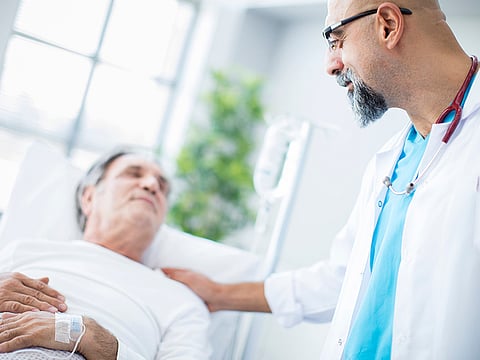Transforming lives for burn victims
DHA will open a state-of-the-art Skin Bank for those who require treatment for severe burns and other conditions

Patients who sustain severe burns and trauma go through an unfathomable amount of pain and suffering. Their lives will now be transformed for the better with access to donated skin, which will help them heal faster with reduced chances of infection and their pain and discomfort will be minimised.
DHA will achieve this through its plans to open a state-of-the-art Skin Bank in 2019. The bank will be the first-of-its-kind in the Middle East and aims to provide a ready source of clinically safe human donor skin to treat severe burns and other cases where donor skin is needed to provide patients with a new lease of life.
The bank will follow stringent international protocols and DHA has already sought and obtained approval from the Islamic Affairs Department on the subject as per Sharia rules and regulations.
The project is currently in the feasibility study phase and the idea to set up this bank was presented to DHA management by the Burn Unit at Rashid Hospital.
“The idea is simple and yet it is extremely impactful,” says Dr Younis Kazim, CEO of Dubai Healthcare Corporation at DHA. “It will directly benefit patients and improve patient outcomes. Moreover, it will reduce the risk of mortality in severe burn cases and provide patients with pain relief, which is vital.
“We will use excess skin from patients who undergo bariatric surgery. After receiving their consent we will test, process and store the excess skin as per international protocols. The donor skin will be used for patients who cannot undergo skin grafting. Skin grafting is a surgical procedure that involves removing skin from one area of the body and moving or transplanting it to a different area of the body, such as 90 per cent burn cases.”
Rashid Hospital has the only dedicated Burn Unit in Dubai and the northern emirates. The unit falls under the Plastic Surgery Department. In 2016, the unit was expanded to include an operation theatre. The unit has ICU beds and is fully equipped to deal with burn cases from admission to discharge.
In 2016, the department received 38 major cases, with 42 cases last year. Additionally, the emergency department received minor burn cases that were treated in an outpatient setting.
The major cases received were due to thermal — flame, hot water, oil burns, trauma, car accidents, electrical and chemical burns. The majority of cases involved children, labourers and house cleaners. Some cases are a direct result of home accidents involving hot liquids, oil, hot water being spilt on the child in the bathroom or kitchen, and at times, during contact with hot surfaces such as a barbecue pit or iron. Paediatric burn cases are seen in Latifa Hospital.
In some cases, such as car accidents or gas explosions, the burns are as high as 90 per cent so there is no chance of covering the raw area with the patient’s own skin and the only solution is donor skin.
“The plastic surgery unit conducts bariatric surgery on four to five patients every week,” says Dr Kazim. “The department conducts surgery on those patients who need it for medical reasons after they have exhausted other non-surgical methods of weight loss. On average, one square metre of excess skin is currently thrown away per week. Once the bank is established, this skin can be processed and used for patients in dire need of this skin. We estimate that the excess skin collected will be sufficient to fulfil the needs of our patients and we will not need to import any skin.”
Future projects
Another healthcare field where DHA is keen to provide 360-degree spectrum of care is oncology. “While cancer care is available in Dubai, it is fragmented at the moment,” explains Dr Kazim. “We will establish a Centre of Excellence for Oncology in Dubai Hospital.”
DHA will also establish a Cardiology Centre of Excellence in Rashid Hospital. The centre will perform all types of cardiac surgeries and research related to the management of heart diseases. DHA is also planning to open a Dialysis Centre in Mamzar.


